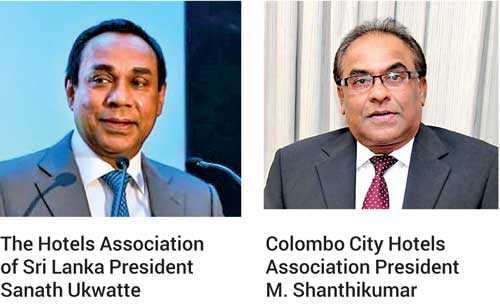Wednesday Feb 18, 2026
Wednesday Feb 18, 2026
Tuesday, 31 December 2019 02:41 - - {{hitsCtrl.values.hits}}
By Charumini de Silva
The tourism industry is urging the continuation of the fee-free visa regime, as it has been helpful for the post-Easter Sunday setback and key for a more complete recovery, whilst any loss of revenue to Government is insignificant considering the net $ 4.4 billion it brings in as foreign exchange earnings.
The appeal by the private sector reportedly follows lobbying by the Immigration and Emigration Department for the suspension of the fee-free visa scheme for nearly 50 countries since August 2019. Whilst the higher-ups in Sri Lanka Tourism weren’t aware of any official move, concerned industry leaders stressed the scheme must be continued.
“The waiver of visa fees is an encouragement and we prefer it to be continued for a further year until the tourism industry is fully recovered,” The Hotels Association of Sri Lanka President Sanath Ukwatte told Daily FT. 
He pointed out that the scheme was beneficial especially when families travel to Sri Lanka, and that globally visa-free arrangements had helped many tourist destinations.
Colombo City Hotels Association President M. Shanthikumar too insisted that the fee-free visa scheme must be continued until the end of 2020 as part of full recovery phase for the tourism industry. He said the scheme was helpful to keep tourists arriving especially from regional markets.
Shanthikumar said the industry would lobby for the scheme’s continuity when they meet Tourism and Aviation Minister Prasanna Ranatunga, who also holds the Industrial Exports and Investment Promotions portfolios, in the first week of January.
Industry analysts have pointed out the existence of the free visa policy was one of the main reasons for the decline in arrivals after the Easter attacks to only be limited to 20% and not higher. They also highlighted the failure by the previous administration to launch an urgent PR and marketing campaign immediately after the terror attacks to pull numbers back up. Right after the tragedy, tourist arrivals fell by as much as 70%.
They also opined that the Immigration Department’s assertion of a Rs. 4 billion loss in revenue due to the scheme so far this year was insignificant as it amounted to mere 0.5% of the Rs. 790 billion or $ 4.4 billion earned via tourism annually.
In terms of concerns over security, industry sources said what had been waived off was only the fee and any visitor was still required to apply for visa in advance. In that context, background checks are still possible if needed. Sri Lanka offers visa-free arrivals only for Singaporeans on a reciprocal basis.
In October, Tim Clark, President of Emirates Airlines, the world’s biggest airline that was a one-time manager and part-owner of SriLankan Airlines, described the fee-free visa scheme as a “positive and welcome step in the right direction” as visa restrictions are a mental hurdle for many people when it comes to making travel choices. “It’s a hassle we could all do without,” he added.
However, Clark went on to urge Sri Lanka to be more innovative and bold as the existing scheme wasn’t a ground-breaking move or a standout initiative in the global tourism market, as visitors still needed to fill up online forms or make time to obtain their visas, whether on arrival or ahead of time. Tourists from 100+ other nations around the world would still need ETAs or visas in advance to enter Sri Lanka.
“What if… we could abandon reciprocity principles, and throw open Sri Lanka’s doors so that it becomes ‘the most welcoming nation’ on the planet? What if... we could do away with any sort of form-filling altogether for travellers already on the visa-free program, and instead use innovative ways to manage the security assurances – for instance through biometric technology at the airport?” asked Clark during his well-received speech at The Hotels Association (THASL) Annual General Meeting.
“Reducing or removing visa barriers to attract visitors is great. But in the face of stiff competition from other global destinations, I think there’s a case to look at bold and innovative ways to attract repeat visits and command a bigger share of wallet from foreign visitors, especially those of certain financial means and lifestyle demographics,” the Emirates Airlines President added.
In his speech, Clark also recounted his own experience of visa fees. “I paid a small fee for the business tourist visa. My wife who accompanied me on this trip did not have to pay for her entry visa, as she’s here purely on a leisure visit. Two of us, two visa requirements and two different processing routes. Why not just do away with the whole rigmarole?” Clark told the THASL AGM.